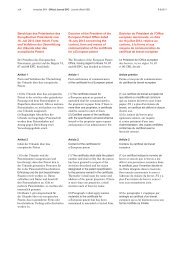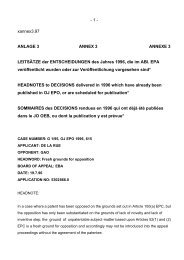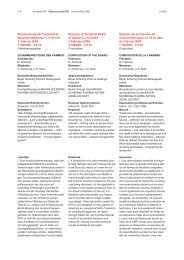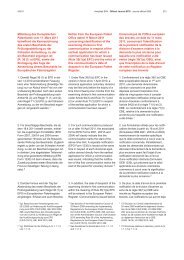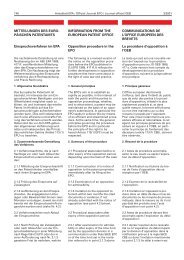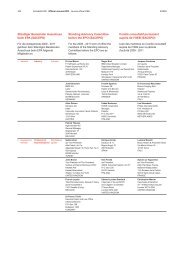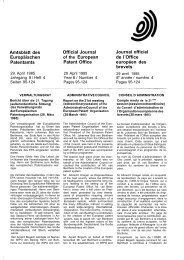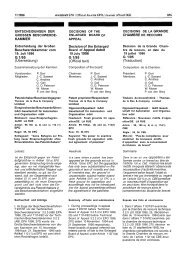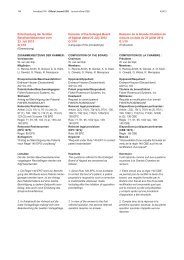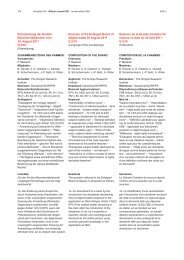Sonderausgabe 1 - European Patent Office
Sonderausgabe 1 - European Patent Office
Sonderausgabe 1 - European Patent Office
You also want an ePaper? Increase the reach of your titles
YUMPU automatically turns print PDFs into web optimized ePapers that Google loves.
188<br />
<strong>Sonderausgabe</strong> Nr. 1 ABl. EPA / Special edition No. 1 OJ EPO / Edition spéciale n° 1 JO OEB<br />
(7) Die Absätze 2 und 4 sind auf den<br />
Widerruf von Vollmachten anzuwenden.<br />
(8) Ein Vertreter gilt so lange als bevollmächtigt,<br />
bis das Erlöschen seiner Vollmacht<br />
dem Europäischen <strong>Patent</strong>amt<br />
angezeigt worden ist.<br />
(9) Sofern die Vollmacht nichts anderes<br />
bestimmt, erlischt sie gegenüber dem<br />
Europäischen <strong>Patent</strong>amt nicht mit dem<br />
Tod des Vollmachtgebers.<br />
(10) Hat ein Beteiligter mehrere Vertreter<br />
bestellt, so sind diese ungeachtet einer<br />
abweichenden Bestimmung in der<br />
Anzeige über ihre Bestellung oder in der<br />
Vollmacht berechtigt, sowohl gemeinschaftlich<br />
als auch einzeln zu handeln.<br />
(11) Die Bevollmächtigung eines Zusammenschlusses<br />
von Vertretern gilt als<br />
Bevollmächtigung für jeden Vertreter, der<br />
den Nachweis erbringt, dass er in<br />
diesem Zusammenschluss tätig ist.<br />
Regel 153<br />
Zeugnisverweigerungsrecht des<br />
Vertreters<br />
(1) Wird ein zugelassener Vertreter in<br />
ebendieser Eigenschaft zurate gezogen,<br />
so sind in Verfahren vor dem Europäischen<br />
<strong>Patent</strong>amt alle diesbezüglichen<br />
Mitteilungen zwischen dem Vertreter und<br />
seinem Mandanten oder Dritten, die<br />
unter Artikel 2 der Vorschriften in Disziplinarangelegenheiten<br />
von zugelassenen<br />
Vertretern fallen, auf Dauer von der<br />
Offenlegung befreit, sofern der Mandant<br />
darauf nicht ausdrücklich verzichtet.<br />
(2) Von der Offenlegung befreit sind<br />
insbesondere Mitteilungen und Unterlagen<br />
in Bezug auf:<br />
a) die Beurteilung der <strong>Patent</strong>ierbarkeit<br />
einer Erfindung;<br />
b) die Erstellung oder Bearbeitung einer<br />
europäischen <strong>Patent</strong>anmeldung;<br />
c) Stellungnahmen zu Gültigkeit, Schutzbereich<br />
oder Verletzung eines europäischen<br />
<strong>Patent</strong>s oder einer europäischen<br />
<strong>Patent</strong>anmeldung.<br />
(7) Paragraphs 2 and 4 shall apply to the<br />
withdrawal of an authorisation.<br />
(8) A representative shall be deemed to<br />
be authorised until the termination of his<br />
authorisation has been communicated to<br />
the <strong>European</strong> <strong>Patent</strong> <strong>Office</strong>.<br />
(9) Unless it expressly provides otherwise,<br />
an authorisation shall not terminate<br />
visàvis the <strong>European</strong> <strong>Patent</strong> <strong>Office</strong><br />
upon the death of the person who gave<br />
it.<br />
(10) If a party appoints several representatives,<br />
they may act either jointly or<br />
singly, notwithstanding any provisions to<br />
the contrary in the communication of<br />
their appointment or in the authorisation.<br />
(11) The authorisation of an association<br />
of representatives shall be deemed to be<br />
an authorisation of any representative<br />
who can provide evidence that he practises<br />
within that association.<br />
Rule 153<br />
Attorney evidentiary privilege<br />
(1) Where advice is sought from a<br />
professional representative in his<br />
capacity as such, all communications<br />
between the professional representative<br />
and his client or any other person,<br />
relating to that purpose and falling under<br />
Article 2 of the Regulation on discipline<br />
for professional representatives, are<br />
permanently privileged from disclosure<br />
in proceedings before the <strong>European</strong><br />
<strong>Patent</strong> <strong>Office</strong>, unless such privilege is<br />
expressly waived by the client.<br />
(2) Such privilege from disclosure shall<br />
apply, in particular, to any communication<br />
or document relating to:<br />
(a) the assessment of the patentability of<br />
an invention;<br />
(b) the preparation or prosecution of a<br />
<strong>European</strong> patent application;<br />
(c) any opinion relating to the validity,<br />
scopeofprotectionorinfringementofa<br />
<strong>European</strong> patent or a <strong>European</strong> patent<br />
application.<br />
2007<br />
(7) Les paragraphes 2 et 4 sont applicables<br />
à la révocation du pouvoir.<br />
(8) Un mandataire est réputé être<br />
mandaté aussi longtemps que la cessation<br />
de son mandat n’a paséténotifiéeà<br />
l’<strong>Office</strong> européen des brevets.<br />
(9) Sauf s’il en dispose autrement, le<br />
pouvoir ne prend pas fin, à l’égard de<br />
l’<strong>Office</strong> européen des brevets, au décès<br />
du mandant.<br />
(10) Si une partie désigne plusieurs<br />
mandataires, ceuxci, nonobstant toute<br />
disposition contraire de l’avis de leur<br />
constitution ou du pouvoir, peuvent agir<br />
soit en commun, soit séparément.<br />
(11) La désignation d’un groupement de<br />
mandataires est réputée conférer<br />
pouvoir d’agir à tout mandataire qui peut<br />
prouver qu’il exerce au sein du groupement.<br />
Règle 153<br />
Droit de ne pas divulguer les communications<br />
entre un mandataire agréé et<br />
son mandant<br />
(1) Lorsqu’un mandataire agréé est<br />
consulté en cette qualité, il ne peut en<br />
aucun cas être contraint, dans les procédures<br />
devant l’<strong>Office</strong> européen des<br />
brevets, de divulguer les communications<br />
échangées à ce propos entre lui et<br />
son mandant ou toute autre personne et<br />
relevant de l’article 2 du règlement en<br />
matière de discipline des mandataires<br />
agréés, à moins que le mandant n’ait<br />
expressément renoncé à ce droit.<br />
(2) Sont notamment concernés toute<br />
communication ou tout document portant<br />
sur :<br />
a) l’appréciation de la brevetabilité d’une<br />
invention ;<br />
b) la préparation de la demande de<br />
brevet européen ou la procédure y<br />
relative ;<br />
c) tout avis concernant la validité,<br />
l’étendue de la protection ou la contrefaçon<br />
de l’objet d’un brevet européen ou<br />
d’une demande de brevet européen.



